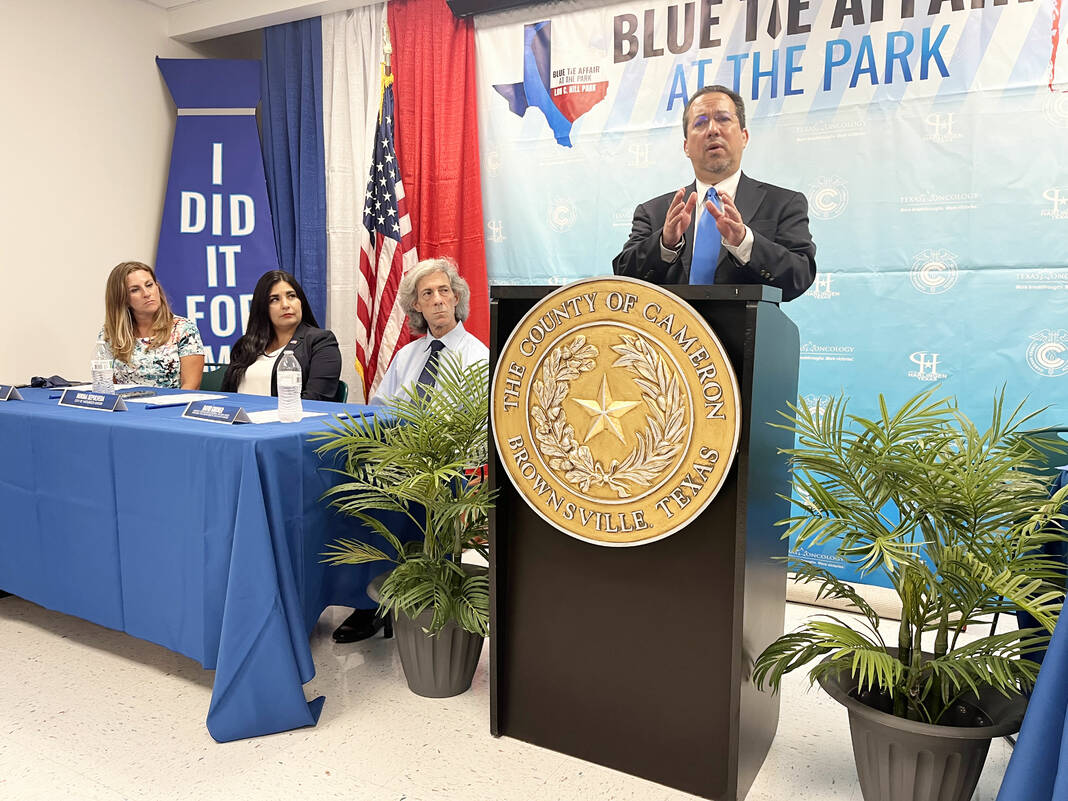SAN BENITO — County officials issued a proclamation Monday designating June 13 as “Blue Tie Day” to remind and encourage men to be aware of preventable health problems by getting regular check-ups.
The event at the county annex building followed Friday’s Blue Tie Day event of 5K and one-mile runs at Lon C. Hill Park, along with a Walk With Your Sweetie one-mile trek.
“We’re asking you today to focus on Blue Tie Day and obviously make the men in your life and each of us aware of our own mortality, and pay attention to the signs and signals that we have in our lives and not take them for granted,” County Judge Eddie Treviño Jr. said. “I was asked on Friday, how important is this? Well, let’s just look at what happened over the last several years.”
“We realize that as a region, the Hispanic individual is prone to certain immuno-compromised situations such as diabetes, which can basically lead to anything and everything, obesity, hypertension,” the judge added. “And as a result of the pandemic, we realized that those predispositions to those conditions created an even greater risk of life to our people in the Rio Grande Valley and particularly Cameron County.”
State Sen. Eddie Lucio Jr. addressed the press conference via video feed from Austin, where he was in conference in committee.
“In 2019, I offered Senate Bill 430 which designated June 13 as Blue Tie Day,” Lucio said. “I chose the color blue because blue is the color associated with the birth of a baby boy. The blue tie serves as a reminder that, although a man has grown up, it serves the same priority it had when he was born.”
Attendees at the event included Natalie O’Roark, executive director of the Texas Oncology Foundation, David Gruber, associate commissioner of regional and local health operations with the Texas Department of State Health Services and Cameron County Health Administrator Esmerelda Guajardo.
“Screening saves lives, it really does. I think everyone has an experience with a loved one where they forgo going to the doctor and there are consequences to that,” said Harlingen Mayor Norma Sepulveda. “ … I can tell you my older brother in 2001 shortly after I got married, I learned that he had leukemia. And he had been suffering with this for such a long time and then it was new but you could tell something was wrong, but he was dedicated to work and life and didn’t make it to the doctor. So when he got to the doctor, it was so advanced that we lost him shortly after that.”
As did many of those speaking Monday, state associate health commissioner Gruber touched on the reluctance of many men to undergo regular health examinations.
“One thing came across my mind, and maybe it’s the most obvious thing, but it’s not said a lot. And that is that men are stubborn, lets’ face it,” he said. “A major reason that the issues have come up … is that there’s this apprehension or belief by men that we have to be strong and we cannot show weakness, when in fact it’s almost the opposite.
“By taking care of ourselves, by taking care of both physical and mental health, challenges that we come across, we can be stronger in the long run,” he added. “We can be there for our families, we can be there for our communities, we can be there for the people who need us.”
Gilbert Garcia, a retired police officer, talked about his fight with cancer.
“Back in 2005, I had bad news that I had colon cancer,” he said. “And it was a very hard time. For three months I was bedridden, and it was hard for me to come back. But with the grace of God, He gave me a second chance.”
“And I proved you can make it by having your screening and your annual physical check-ups,” he added. “You have to stay on it, because if not it can get worse. If I hadn’t done the screening and my physical check-up like I did, I probably wouldn’t be here.”





